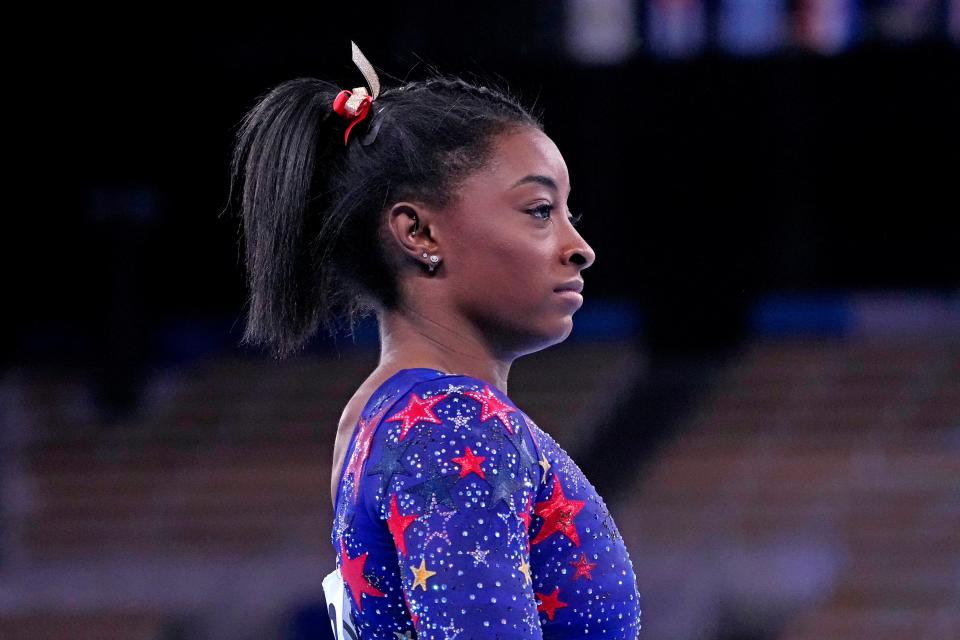Opinion: Simone Biles' decision to withdraw in team event at Olympics sends powerful message about mental health
TOKYO – We have seen powerful performances from Simone Biles before.
Nothing quite like this, however.
With her anxiety growing and feeling as if she was carrying the weight of the world on her shoulders, Biles withdrew one event into the team competition Tuesday. She couldn’t cope emotionally, and her disastrous vault showed that she was putting herself at risk physically, too.
“I have to put my pride aside,” Biles said afterward. “I have to do what's right for me and focus on my mental health and not jeopardize my health and my well-being. So that's why I decided to kind of take a step back.
“At the end of the day, we're human, too, so we have to protect our mind and our body rather than just go out there and do what the world wants us to do.”

The U.S. women wound up with a silver medal, the first time since 2010 they did not win the team title at a world championships or an Olympics. But to focus on that, or wonder what might have been, misses the big picture.
By withdrawing, Biles let the world know that it is OK to not be OK, and the importance of that message, the people it might touch, cannot be overstated.
For all the growing awareness of the importance of mental health, there remains a stigma in actually prioritizing it and treating it as we would a physical injury. If Simone Biles can take a step back from the world’s biggest stage, when the stakes are at their highest, it might just give others the courage to speak up when they need help, too.
“How mature is that?” said Annie Heffernon, vice president of the women’s program for USA Gymnastics. “She knew exactly what she needed to do when she needed to do it.”
Latest from Tokyo: Sign up for our Olympic newsletter to get exclusive insight
Olympic text alerts: We'll be your guide to the Games with the inside scoop sent directly to your phone
Five years ago, Biles wouldn’t have. She would have put herself on autopilot and choked back the rising nerves and feelings of unease.
The U.S. women have been the sport’s most dominant team for more than a decade, and Biles, the best gymnast the sport has ever seen, would have felt an obligation to go win another gold medal for her team and her country, to say nothing of meeting the public’s expectations. She would have pasted on a smile and gutted through the night, ignoring the fact that every routine was taking another little piece of herself.
Biles, like so many other athletes, has become increasingly aware of the toll a lifetime of singular focus and crushing pressure exacts.
In her case, the potential damage is more than just psychological. The skills she does are so difficult, a loss of focus or confidence can be catastrophic.
Even deadly.
“There’s more to life than gymnastics,” Biles said. “It’s very unfortunate that it has to happen at this stage, because I definitely wanted this to go a little bit better.”
The past few years have not been easy for Biles. The four-time gold medalist at the Rio Olympics acknowledged in 2018 that she, too, had been sexually abused by former USA Gymnastics physician Larry Nassar, and she feels a responsibility to use her platform and influence to advocate for the survivors.
She feels betrayed by USA Gymnastics and the U.S. Olympic and Paralympic Committee, and she is constantly trying to separate her love of the sport from the organizations that failed to protect her.
She came to Tokyo as the face of these Olympics, expected to fill the void left by the absences of Michael Phelps and Usain Bolt. It’s been impossible in recent months to turn on the TV without seeing her in a commercial, and it was no coincidence that Thomas Bach, president of the International Olympic Committee, chose Tuesday night to come to the Ariake Gymnastics Center.
Biles thought she was managing all of this, but each day that she was in Tokyo, the more stifled she felt.
“This Olympic Games, I wanted it to be for myself. I came in and I felt like I was still doing it for other people,” Biles said, starting to cry. “That just hurts my heart that doing what I love has been kind of taken away from me to please other people.”
Gold, silver and bronze might be everything to athletes. But sometimes, the price of those precious medals is simply too high, and Biles was unwilling to pay it. Her mental health and her well-being are worth far more.
Follow USA TODAY Sports columnist Nancy Armour on Twitter @nrarmour.
This article originally appeared on USA TODAY: Simone Biles' decision to withdraw shows strength at Summer Olympics

